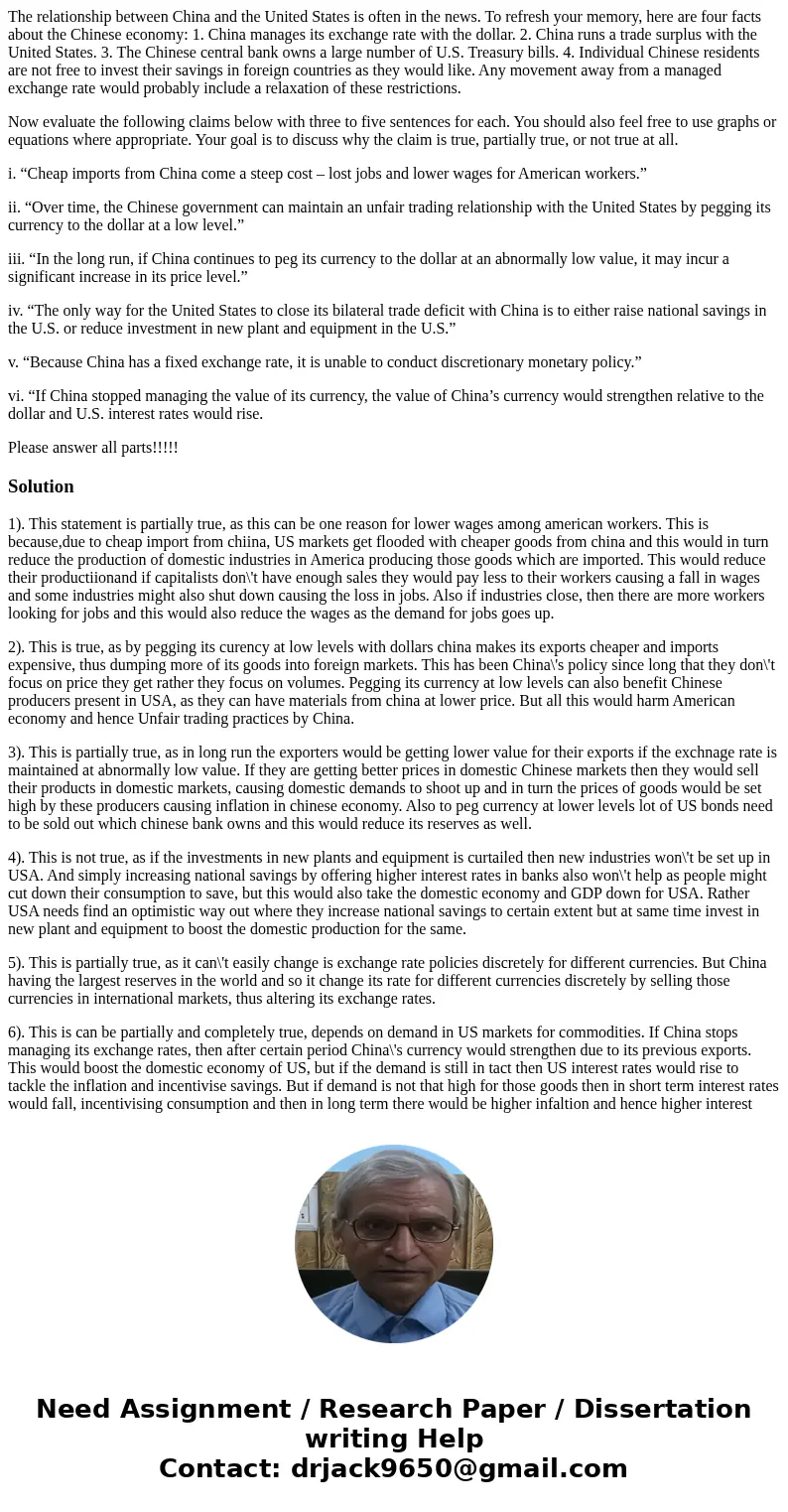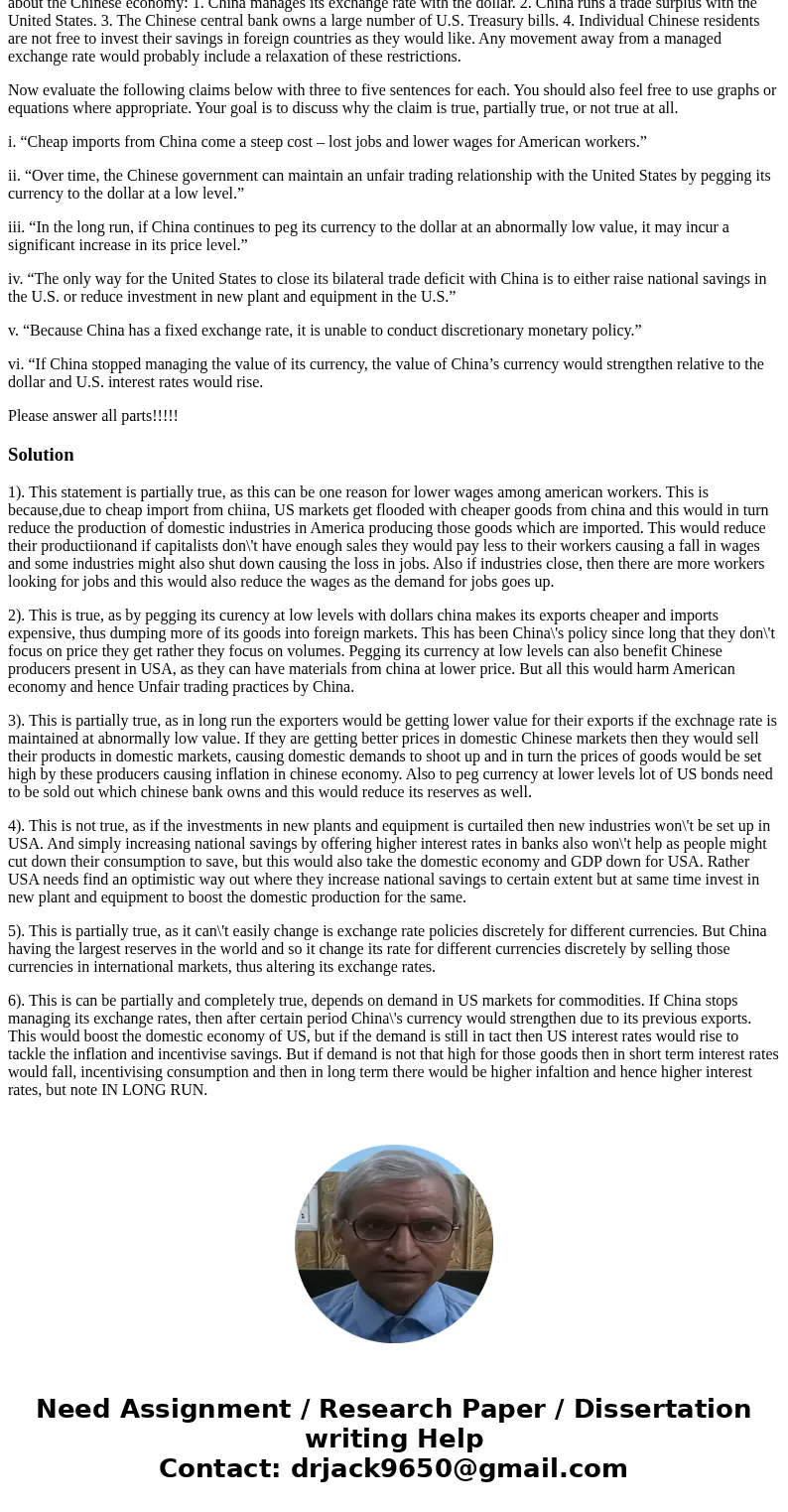The relationship between China and the United States is ofte
The relationship between China and the United States is often in the news. To refresh your memory, here are four facts about the Chinese economy: 1. China manages its exchange rate with the dollar. 2. China runs a trade surplus with the United States. 3. The Chinese central bank owns a large number of U.S. Treasury bills. 4. Individual Chinese residents are not free to invest their savings in foreign countries as they would like. Any movement away from a managed exchange rate would probably include a relaxation of these restrictions.
Now evaluate the following claims below with three to five sentences for each. You should also feel free to use graphs or equations where appropriate. Your goal is to discuss why the claim is true, partially true, or not true at all.
i. “Cheap imports from China come a steep cost – lost jobs and lower wages for American workers.”
ii. “Over time, the Chinese government can maintain an unfair trading relationship with the United States by pegging its currency to the dollar at a low level.”
iii. “In the long run, if China continues to peg its currency to the dollar at an abnormally low value, it may incur a significant increase in its price level.”
iv. “The only way for the United States to close its bilateral trade deficit with China is to either raise national savings in the U.S. or reduce investment in new plant and equipment in the U.S.”
v. “Because China has a fixed exchange rate, it is unable to conduct discretionary monetary policy.”
vi. “If China stopped managing the value of its currency, the value of China’s currency would strengthen relative to the dollar and U.S. interest rates would rise.
Please answer all parts!!!!!
Solution
1). This statement is partially true, as this can be one reason for lower wages among american workers. This is because,due to cheap import from chiina, US markets get flooded with cheaper goods from china and this would in turn reduce the production of domestic industries in America producing those goods which are imported. This would reduce their productiionand if capitalists don\'t have enough sales they would pay less to their workers causing a fall in wages and some industries might also shut down causing the loss in jobs. Also if industries close, then there are more workers looking for jobs and this would also reduce the wages as the demand for jobs goes up.
2). This is true, as by pegging its curency at low levels with dollars china makes its exports cheaper and imports expensive, thus dumping more of its goods into foreign markets. This has been China\'s policy since long that they don\'t focus on price they get rather they focus on volumes. Pegging its currency at low levels can also benefit Chinese producers present in USA, as they can have materials from china at lower price. But all this would harm American economy and hence Unfair trading practices by China.
3). This is partially true, as in long run the exporters would be getting lower value for their exports if the exchnage rate is maintained at abnormally low value. If they are getting better prices in domestic Chinese markets then they would sell their products in domestic markets, causing domestic demands to shoot up and in turn the prices of goods would be set high by these producers causing inflation in chinese economy. Also to peg currency at lower levels lot of US bonds need to be sold out which chinese bank owns and this would reduce its reserves as well.
4). This is not true, as if the investments in new plants and equipment is curtailed then new industries won\'t be set up in USA. And simply increasing national savings by offering higher interest rates in banks also won\'t help as people might cut down their consumption to save, but this would also take the domestic economy and GDP down for USA. Rather USA needs find an optimistic way out where they increase national savings to certain extent but at same time invest in new plant and equipment to boost the domestic production for the same.
5). This is partially true, as it can\'t easily change is exchange rate policies discretely for different currencies. But China having the largest reserves in the world and so it change its rate for different currencies discretely by selling those currencies in international markets, thus altering its exchange rates.
6). This is can be partially and completely true, depends on demand in US markets for commodities. If China stops managing its exchange rates, then after certain period China\'s currency would strengthen due to its previous exports. This would boost the domestic economy of US, but if the demand is still in tact then US interest rates would rise to tackle the inflation and incentivise savings. But if demand is not that high for those goods then in short term interest rates would fall, incentivising consumption and then in long term there would be higher infaltion and hence higher interest rates, but note IN LONG RUN.


 Homework Sourse
Homework Sourse